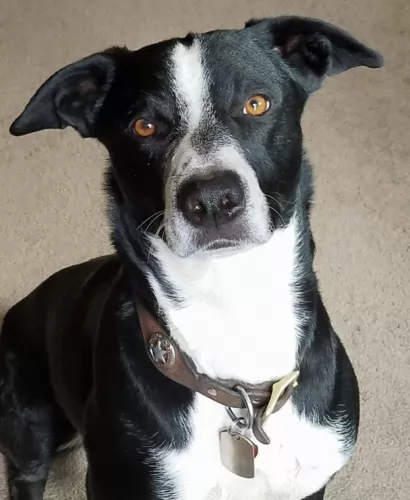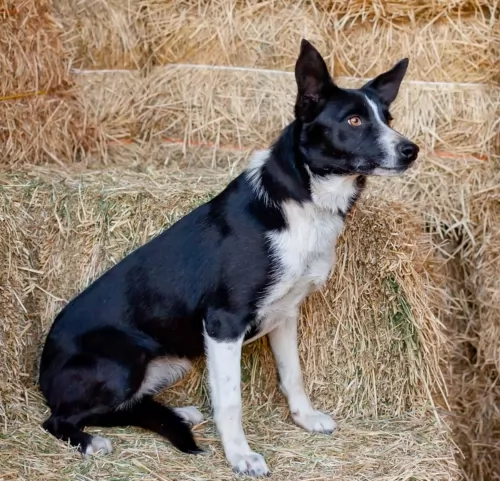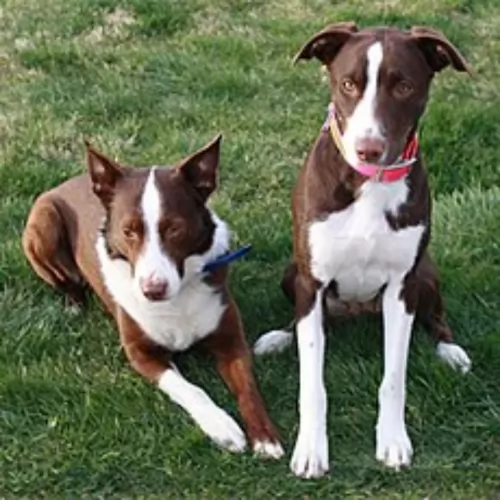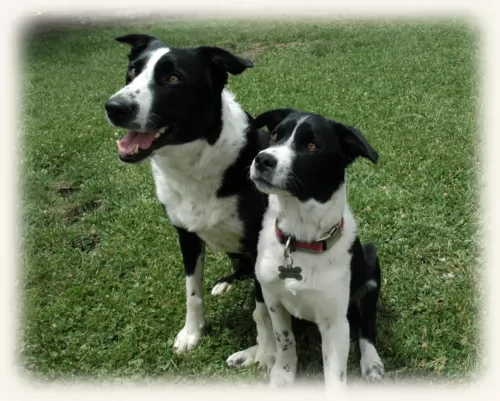 Petzlover
Petzlover McNab is originated from United States but Schipperke is originated from Belgium. McNab may grow 31 cm / 13 inches higher than Schipperke. McNab may weigh 21 kg / 47 pounds more than Schipperke. Both McNab and Schipperke has same life span. Both McNab and Schipperke has same litter size. Both McNab and Schipperke requires Low Maintenance.
McNab is originated from United States but Schipperke is originated from Belgium. McNab may grow 31 cm / 13 inches higher than Schipperke. McNab may weigh 21 kg / 47 pounds more than Schipperke. Both McNab and Schipperke has same life span. Both McNab and Schipperke has same litter size. Both McNab and Schipperke requires Low Maintenance.
 The attractive McNab dog is also known as the McNab Shepherd or McNab Collie. This very lively dog originated in the Mendocino region of Northern California, being specifically bred to withstand tough weather conditions and rough terrain.
The attractive McNab dog is also known as the McNab Shepherd or McNab Collie. This very lively dog originated in the Mendocino region of Northern California, being specifically bred to withstand tough weather conditions and rough terrain.
The dog is becoming popular outside of California now. A Scottish rancher with the surname McNab left Scotland and arrived in California in the 19th century. He crossed Scottish Border Collies with Shepherd dogs and the ranchers in California started using these dogs for herding livestock.
Today they are still being used as herding dogs in California and other countries. The dog isn’t recognized by the American Kennel Club. It was in 2014 that a group of McNab Shepherd breeders established the McNab Shepherd Registry so as to work towards the advancement of the McNab Shepherd.
 The Schipperke is a small dog which hails from Belguim and where he is known as a Spitz.
The Schipperke is a small dog which hails from Belguim and where he is known as a Spitz.
There are however different theories regarding the Schipperke’s origin. It was however during the late 1800s, that Belgian Schipperke fanciers set a standard for the breed.
It was in 1888 that the first Schipperke was imported to the United States and a specialty club for the breed founded in 1905.
 The McNab Dog is a medium-sized working dog. The appearance of this dog varies quite a bit. For instance you may come across a dog with erect ears or floppy ears or a long tail or one that is naturally bobbed.
The McNab Dog is a medium-sized working dog. The appearance of this dog varies quite a bit. For instance you may come across a dog with erect ears or floppy ears or a long tail or one that is naturally bobbed.
When it comes to size, you will find that between the males and females they stand at roughly 40 – 64cm and weigh anything from 14 – 30kg.
Most of these McNabs are black or red with white feet, white tipped tails and white markings around the face. The coat is weather resistant and fairly short and dense. You also get tri-colored McNabs. Eyes are usually a brown or copper color though you might find some with bluish eyes as well.
These are such intelligent dogs so with training and socialization you’ll find he is able to learn easily and quickly. He is a self assured dog, so he will respond well to an owner who is firm and fair, patient, kind and consistent.
He is best suited to life in the country as he needs lots of place to run around. If you don’t live on a farm, take the dog for long walks every day as he requires lots of exercise and mental stimulation. He is a loving family member too, getting along well with kids in the home as well as other pets. He is also a good guard- and watch dog, taking his job as protector of his human family very seriously.
 This little Belgian dog stands at between 25 and 33cm in height and weighs between 3 and 9kg.
This little Belgian dog stands at between 25 and 33cm in height and weighs between 3 and 9kg.
The double coat of the dog is fairly short, but thick and it comes in a range of colors, but always solid, from chocolate to apricot to black.
A typical characteristic of his is the longer-haired ruff around his neck. He also has this longer hair around the hind legs. He has sharp, erect ears and the tail is a natural bobtail or long. Most people choose to have the tail docked.
These little dogs are no pushover. He is stubborn, strong-willed and confident. They are lively, intelligent, curious and energetic and will require plenty of exercise.
Small though he is, he will certainly need training and socialization, otherwise he just goes his own way. Training him will ensure he is obedient and not so strong-willed. They get on well with children, but they tend to be aggressive with other dogs that they haven’t grown up with.
Bring him up the right way and he makes a splendid pet.
 The McNab makes a splendid pet and is known to be even-tempered, being friendly and tolerant with his entire human family.
The McNab makes a splendid pet and is known to be even-tempered, being friendly and tolerant with his entire human family.
He gets on well with children in the home as well as other pets. He has always been a hard working pet and doubles up as being an excellent guard dog too. Those who have had the McNab as a pet say that you couldn’t get a more excellent family canine friend.
 With his bright little face, the Schipperke dog is a surprising dog, being fearless, confident, protective and devoted – everything people looking for in an excellent pet want.
With his bright little face, the Schipperke dog is a surprising dog, being fearless, confident, protective and devoted – everything people looking for in an excellent pet want.
His small size makes him able to slot into life in the city or the countryside. He is also looked upon as low maintenance. Add to this the fact that he is intelligent too. He is a feisty dog, and that’s why we say he is surprising because while he can be your sweet companion dog, he can turn into a robust, feisty, daring little panther. He’s got everything going for him to make you a splendid pet.
 This dog doesn’t really have genetic health issues, but they can suffer with hip dysplasia, a problem that many dogs battle with, whether small or large, young or old.
This dog doesn’t really have genetic health issues, but they can suffer with hip dysplasia, a problem that many dogs battle with, whether small or large, young or old.
They can also suffer with epilepsy and an eye disease such as entropion where the lid of the eye is turned inwards. Check its ears and teeth regularly for infections and keep up to date with his vaccinations.
The McNab is a health dog breed so you aren't likely to face any of these common dog health issues.
 The Schipperke has no real health problems that he specifically gets, and he can live to be 13 years or older.
The Schipperke has no real health problems that he specifically gets, and he can live to be 13 years or older.
Over-feeding, bad food choices and lack of exercise are going to shorten the lifespan of this dog. Some dog illnesses to be aware of with the Schipperke is cancer, bloat, epilepsy, dental problems and luxating patella.
This is a condition where the knee cap of the dog moves out of its natural position. The patella moving out of the normal groove of the thigh bone can be because of genetic or traumatic reasons.
The symptoms of luxating patella include limping, skipping along as well as an abnormal sitting posture. Arthritis can also set in. Strangely, many small dogs live all their lives with luxating patella and they live like that free of pain. However for many other dogs it can mean pain and it can require surgery.
 You can feed your McNab dog commercial dry kibble, but then you want to be sure its the best quality one. Buying inferior foods means that you’re getting a whole lot of ingredients in the food that are bad – sugar, salt, preservatives, fillers, colorants etc. Rather go for the best brands that will ensure that your dog is getting all the vitamins and minerals he needs.
You can feed your McNab dog commercial dry kibble, but then you want to be sure its the best quality one. Buying inferior foods means that you’re getting a whole lot of ingredients in the food that are bad – sugar, salt, preservatives, fillers, colorants etc. Rather go for the best brands that will ensure that your dog is getting all the vitamins and minerals he needs.
Homemade food is also important and foods such as boiled chicken, brown rice and pasta as well as cooked or raw vegetables chopped up and added to his dry kibble can make for a delicious, wholesome treat. It will be to his benefit if you can every now and then give him some raw meat as well. Make sure to see that he has a constant supply of fresh, cool water.
McNab Shepherds are very active dogs and they are going to require quite a bit of physical exercise as well as mental stimulation. They are dogs who have been used to herding livestock and he loves this busy life. It is why he wouldn’t be happy living in the city but is better suited to farm life or in a home with a large garden. Long walks and hikes will suit him as well as swimming and joining in every game there is.
The McNab is considered to be a low maintenance dog and grooming the short thick coat will be required twice a week. Always check around the eyes and ears as well as inside the mouth for problems and infections.
 Dry kibble is always a good choice for dogs as its helps to keep the dog’s teeth clean. You want to make sure you buy one of the best quality foods, full of minerals and vitamins as opposed to fillers, colorants and preservatives. The food you give your Schipperke can have a huge impact on his health.
Dry kibble is always a good choice for dogs as its helps to keep the dog’s teeth clean. You want to make sure you buy one of the best quality foods, full of minerals and vitamins as opposed to fillers, colorants and preservatives. The food you give your Schipperke can have a huge impact on his health.
Your puppy will require 4 meals a day but later this becomes 2 bowls of food. To add some variety to your pet’s diet, feed him some home made food occasionally which can be added to his dry kibble twice a week.
Boiled chicken, brown rice or pasta and spinach, sweet potatoes and carrots are a healthy choice for your Schipperke.
Try and include some raw meat into the diet as this can help in fighting off horrible skin diseases. Make sure he has constant access to fresh, cool water.
Ensure regular vet checks for your dog, particularly when he is showing signs of being sick.
Check your pet for ticks and fleas. Parasites can be very bad for your pet’s health. Your dog will need all his vaccines to stave off deadly canine illnesses.
Brush your Schipperke twice a week to make sure you get rid of loose hairs. A Schipperke doesn’t shed a lot.
Keep his nails trimmed. If you are unsure on how to do this, professional groomers can do this for you.
Ears and eyes should also be checked.
He’s an energetic little dog so make sure that he gets lot of excellent forms of exercise from walking to hikes to ball games, frisbee – you name it, you won’t tire him out easily.